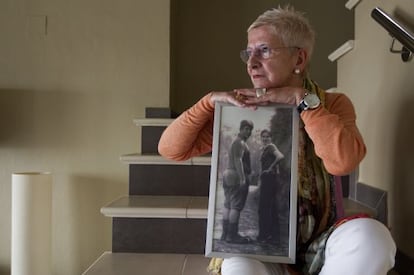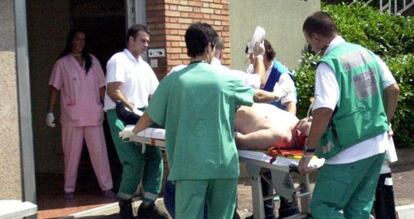"I'm sure my husband would have tried to talk to his own killers"
Maixabel Lasa decided to meet one of the ETA assassins who made her a widow


Nearly 11 years after the fact, Maixabel Lasa took the decision to sit down and talk to one of the three ETA hitmen who murdered her husband, Juan María Jauregi. "I decided to meet the person who had caused the most damage to me and my daughter in our entire lives," she recalls. "I did it because, in the end, I believe in giving a second chance to those who eventually admit that they did a bad thing, that the pain they inflicted was not justifiable... to those who regret having killed innocent people. I prefer that to having them feel proud of their assassinations. To me, that's worth something."
The meeting took place on Thursday, May 26, 2011, she remembers. Back then, she was still director general of the Basque government's Office for Terrorism Victims - a post she left last December, with the change in the regional government.
With no more political responsibilities, Lasa felt free to talk to EL PAÍS in her vacation home in Huelva, Andalusia, where she discussed the content of the meeting with one of the men who shot her husband dead on July 29, 2000 in Tolosa (Gipuzkoa), while she was at home making lunch.
Juan María Jauregi had been the civil governor of the Basque province of Gipuzkoa between 1994 and 1996, during the Socialist administration of Prime Minister Felipe González. In 2000 he was working in Chile for Aldeasa, a multinational airport retailer. He had asked for a job away from home because he was aware that he was a target for the Basque terrorist group. But every three months he would travel back to see his family. It was during one of these visits that the terrorists spotted their chance to kill him.
Juan María Jauregi had been the civil governor of the province of Gipuzkoa
It took his widow a very long time to get used to the idea that she would not be getting any more calls from him, and that she would never see him walk through the door again. "I had a really, really tough time of it," she says, producing a photograph of the couple when they were just 16. "We'd known each other all our lives. ETA cut our expectations short radically. Just like that," she explains. "But Juan Mari liked to talk to everybody. He was a firm believer in the power of words. In fact, I think that's why they killed him - because of his penchant for dialogue, for reaching out and building bridges. I am convinced that he would have tried to talk to the people who killed him. I know there are victims who do not understand this, but I am convinced that I did the right thing by accepting to meet. Afterwards, I felt relieved."
Lasa was part of a pilot program launched by the Socialist government in 2010, to get jailed ETA members to meet relatives of their victims face to face. It was meant as a way to start healing wounds in preparation for the terrorists' expected announcement of a permanent ceasefire, which eventually took place in October 2011.
The first four meetings were held in May 2011; there would be seven more later on. At the time, Lasa was the only victim who agreed to meet with one of the actual perpetrators of the attack on her husband. It was he who had requested to meet her. Additionally, the Prisons Bureau had asked her agency for help with the program, to see if she could find victims who might be interested in participating.
"As well as being the agency director, I was a victim. And if one of the people who killed my husband had asked to see me, I had every right in the world to either accept to meet him or not," she argues. "I also think that since we'd already phoned other victims to tell them about the program, it was important that I should be willing to participate too. This obviously does not mean that everyone has to do the same. I am no better than anybody for having accepted. But I am no worse, either."

On February 14, 2004 the High Court sentenced each of the three assassins - Ibon Etxezarreta, Luis María Carrasco and Patxi Xabier Makazaga - to 39 years in prison. Carrasco and Etxezarreta had attempted to kill Jauregi inside a bar one day, but desisted when they saw some acquaintances inside. It was finally Makazaga who did the deed on a different day, inside the cafeteria next to the pelota court, on Tolosa's main street. He shot him twice in the back, while Carrasco kept watch outside and Etxezarreta waited inside a stolen car. The night before, Jauregi had dreamt that he was killed, and he told his wife about the dream on the same morning of his assassination.
Thirteen years later, two of the killers are part of the group of ETA inmates who have condemned the use of violence. One of them met with Lasa.
Question. What was the first moment of the meeting like?
Answer. We were inside a small meeting room at Nanclares de Oca penitentiary, in the Basque province of Álava, where most of the repentant ETA inmates serve their terms [One of the long-held demands of ETA is that its jailed members be allowed to serve time close to home, rather than in prisons elsewhere in Spain].The mediator introduced us. We shook hands and looked each other in the eye. I took great notice of his gestures and his face. He seemed to be a lot more nervous than I was. I think that makes sense, since I hadn't done anything wrong. He was the one who needed to explain why and to what purpose all of this had happened. Why they killed my husband. I was there to see the person who had hurt me the most, but I was calm.
He wanted a job abroad because he knew he was a target for Basque terrorists
Q. Why did you go? What did you want to find out?
A. I was curious, I had a lot of questions to ask... And I saw this as my chance to find out. But I was there because I knew that this was a person who had done some soul-searching and who disapproved of what he did during the years he worked for ETA. I also knew he was not going to get prison benefits out of the meeting - that he would not be getting any material gain from it. On the other hand, I always thought that if Juan Mari had had a chance to talk to his murderers, he might have convinced them not to pull the trigger.
Q. How much did you know about the person you were about to see?
A. Very little. I didn't even know what he looked like physically. At the trial I didn't get a chance to see the defendants. I was there as a witness. When they announced my arrival, [the accused] began to make a racket and they were taken outside the room, so I was unable to see them. I hadn't seen any newspaper photographs, either.
The night before his murder, Jauregi had told his wife he had dreamt he was killed
Q. What did you tell him when you finally had him before you?
A. One of the first things I asked him was whether he knew Juan Mari, whether he knew who he was. He said he didn't know him, that he simply got an order and carried it out. That's it. He knew nothing about Juan Mari's life - didn't know he'd been in jail, had been an ETA member, had been a member of the Communist Party, had given testimony against a general in the Lasa and Zabala case [ETA members killed by a secret government death squad in 1983]. He didn't even know he'd been the governor of Gipuzkoa. Or that we had a daughter. Really, he knew nothing at all, either personal or professional. He killed a complete unknown.
Q. He didn't know why Juan Mari had become an ETA target?
A. No. I always believed they killed him because he tried to build bridges. Juan Mari had worked really hard to solve the terrorism problem. He thought that the longer it took, the harder it would be, because [ETA] would enlist younger, more fanatical kids, with no historical memory, who would think they were out to save the homeland when in fact we've had a democracy for many decades. But the person I met knew nothing of all this.
He was the one who needed to explain for what purpose all of this had happened"
Q. Did you ask him for details of the attack?
A. I've got the court papers at home and I more or less knew what had happened... The day of the failed attempt I'd been with Juan Mari. I asked the prisoner whether they would have killed him then anyway, with me there. He said yes, that wouldn't have mattered. I also wanted to know who gave the order to kill him, but he didn't know. It's amazing how they killed without knowing who or why.
Q. And what did you explain to him?
A. I told him how all our future plans had been destroyed. Juan Mari was going to be stationed in Jordan, and I was going to ask for leave so I could be with him... I told him what a rough time I had. Juan Mari was living in Chile at the time and we only saw each other every three months. But we talked on the phone often. I explained how I often waited for his call, even after his death. On occasion, I even dialed his old number in Chile. I was constantly expecting him to walk in the door. Since I didn't see him on a daily basis, it was very hard for me to accept that he was no longer there at all. I still think about Juan Mari every day. And not once, but millions of times.
He knew nothing about him, personal or professional. He killed an unknown"
Q. Why won't you give out the name of the prisoner you met?
A. I would rather not before running it by him first. In any case, it was one of the three people who were convicted for Juan Mari's assassination.
Q. What made the deepest impression on you during the meeting?
A. The prisoner told me he felt there was nothing good inside of him, that everything about him was bad. "If that were true, you wouldn't be here now, and neither would I," I told him. "If you've realized what you've done and go to bed each night thinking you did something wrong, I think there is some good in you. I think you have recovered your freedom and your right to be a citizen." There is merit to facing your past and admitting to the mistake of violence. I think it's the correct road. I know not all [ETA] prisoners will walk down that road... But those who do deserve a second chance.
There is merit to facing your past and admitting to the mistake of violence"
Q. Do you understand why some victims think it strange to give a second chance to those who, like you say, hurt them the most in life?
A. I understand. But I have always thought the same way. We need to bring these people into the fold of democracy and make them part of a future peaceful coexistence. I also think that the position of these prisoners is the strongest form of delegitimizing violence. And on a personal note, I feel better after the meeting. I have seen that, at some level, the people who killed Juan Mari regret the pain they have caused. At least two of them do. I suppose the third one is still very proud. But I am relieved to think that the other two consider it a mistake. At least you feel that everything we've been doing - the mediators, the victims... - and the prisoners' stock-taking, that all of it has served a purpose. It cannot be easy for them, either. It is easier to remain part of the mass and continue to defend violence without facing the pain they have caused or be called traitors by ETA.
Q. Should the government encourage this kind of attitude among other prisoners?
A. I think so, yes. New meetings and prisoner workshops should be encouraged. Pure logic dictates that only an internal debate at the prisons will offer [prisoners] a chance to evolve. Every person must accept his or her share of responsibility for the past. I think these prisoners are doing that, even as they criticize state terrorism as well. I think in that sense they are ahead of the abertzale [the political representatives of pro-independence radicals], who have yet to admit to certain responsibilities.
Q. How did you say goodbye to the prisoner?
A. He asked for forgiveness. I thanked him, but said that it was a very personal thing and that I could not give him an answer. I hugged him and said that I wouldn't mind seeing him again.
Tu suscripción se está usando en otro dispositivo
¿Quieres añadir otro usuario a tu suscripción?
Si continúas leyendo en este dispositivo, no se podrá leer en el otro.
FlechaTu suscripción se está usando en otro dispositivo y solo puedes acceder a EL PAÍS desde un dispositivo a la vez.
Si quieres compartir tu cuenta, cambia tu suscripción a la modalidad Premium, así podrás añadir otro usuario. Cada uno accederá con su propia cuenta de email, lo que os permitirá personalizar vuestra experiencia en EL PAÍS.
¿Tienes una suscripción de empresa? Accede aquí para contratar más cuentas.
En el caso de no saber quién está usando tu cuenta, te recomendamos cambiar tu contraseña aquí.
Si decides continuar compartiendo tu cuenta, este mensaje se mostrará en tu dispositivo y en el de la otra persona que está usando tu cuenta de forma indefinida, afectando a tu experiencia de lectura. Puedes consultar aquí los términos y condiciones de la suscripción digital.








































